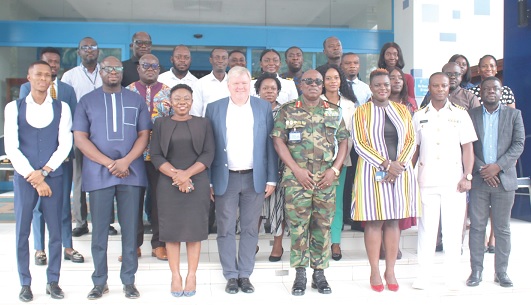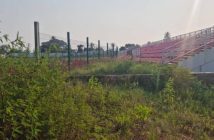|
Getting your Trinity Audio player ready...
|
A five-day programme to build the capacity of journalists in maritime security issues is underway in Takoradi in the Western Region.
Twenty practitioners from selected media houses and media liaisons of state agencies in maritime security are participating in the programme.
The pilot course which forms part of a five-year capacity-building project on “Integrated responses to threats to maritime safety and security in the Gulf of Guinea maritime (GoG) domain in West and Central Africa”, is being organised by the Kofi Annan International Peacekeeping Training Centre (KAIPTC) and the Danish government.
Participants are being taken through topics such as the introduction to Blue economy, introduction to maritime security, policy and legal frameworks on maritime security, media and maritime security, law and ethics in maritime security reporting, coastal communities and maritime security, and gender, livelihoods and maritime security.
Significance
The Danish Ambassador to Ghana, Tom Norring, said the role of the media was key in raising awareness of maritime security and also influencing maritime policy and strategy formulation.
With the complexities of maritime crimes and the likelihood for misinformation which often counter maritime security efforts, the role of the media in highlighting the challenges cannot be overlooked.”
“Responsible and skilled journalism can inspire action, shape public opinion to work towards a safe and a more secure maritime environment,” he added.
According to the ambassador, the training would also encourage participants to write compelling stories that would support the monitoring and evaluation of maritime security efforts by both state and non-state actors at the national and regional levels.
The Commandant of the KAIPTC, Major-General Richard Addo Gyane, also said that the goal of the project was to sensitise stakeholders in the Gulf of Guinea maritime domain to better understand the security landscape, increase collaboration, cooperation and coordination to promote harmony in the sector.
Impact
The Gulf of Guinea maritime domain has a significant impact on the livelihoods of citizens, given the huge volume of trade that occurs through it by sea.
Access to safe, secure maritime transit routes are, therefore, vital to the successful integration of goods and services in the global marketplace.
However, diverse challenges from piracy and armed robbery at sea, including illicit oil and fuel activities, illegal unreported and unregulated fishing (IUU), trafficking of drugs, weapons and humans, and various environmental crimes continue to threaten the safety, security and sustainability of the maritime space in West and Central Africa.
Sourcr: myghanadaily





